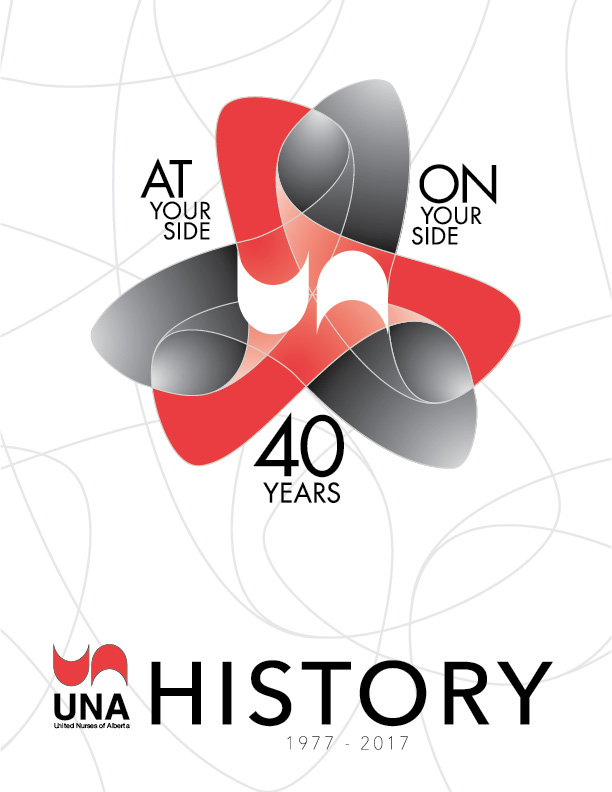About
UNA: The union for Alberta’s nurses
Working for improvements for nurses, our profession, our patients, our residents and clients, and all Albertans.
United Nurses of Alberta – your workplace representative
United Nurses of Alberta is the union for more than 35,000 Registered Nurses, Registered Psychiatric Nurses and allied workers in Alberta.
Since 1977, UNA has been an effective advocate for its duespayers, the nursing profession, and our public health care system.
UNA represents its duespayers in bargaining, in their profession, and in disputes with employers and professional licensing bodies.
UNA is deeply committed to member democracy. It is affiliated with the Canadian
What UNA does for nurses
UNA provides a wide range of services to its duespayers. A key role is negotiating the excellent collective agreements that regulate salaries, benefits, schedules, and working conditions.
UNA also administers its agreements to resolve disputes, improve working conditions and protect your workplace rights. Members of the union’s staff represent members before Labour Relations Board hearings, professional bodies’ disciplinary
How UNA is financed
UNA is financed by all of us, members who benefit from UNA’s collective agreements. Each of us pays 1.5 per cent of our gross monthly income in tax-deductible union dues. Budgets are subject to approval by democratically elected delegates to the Annual General Meeting.
When they start to work at a UNA worksite, most nurses sign a membership card as soon as possible. This gives them
Those who choose not to join still have to pay dues, because the courts in Canada have determined all employees in
UNA’s approach to collective bargaining
Bargaining collective agreements
A collective agreement is a legally binding contract between a union, negotiating on behalf of a group of employees, and an employer. Typically, collective agreements set out such things as wages, scheduling rules, overtime pay, sick leave, job security, benefits, and other employee rights.
Since it was founded, UNA has negotiated collective agreements that have greatly improved salaries, benefits, and workplace conditions for all members. UNA has more than quintupled the wages of Alberta nurses since it was founded. In 1977, a new nurse earned only $6.28 an hour!
Members set UNA’s bargaining priorities
Before the expiry date of any UNA collective agreement, affected members can attend “demand setting meetings” at which the locals determine their bargaining proposals.
This is the process through which UNA’s members democratically decide their priorities in bargaining. UNA’s negotiating committees, the people who actually meet with the employer’s representatives at the bargaining table, are made up of working members of the union, elected by their co-workers to represent them.
UNA members vote on their agreements
No UNA agreement takes effect before the members whose working lives it governs have the opportunity to discuss and ratify it in a democratic vote. Province-wide agreements like the contract with Alberta Health Services must be subject to a vote of all affected
Are strikes by nurses legal?
Strikes by
Land Acknowledgment
United Nurses of Alberta respectfully acknowledges that the land on which we are privileged to gather is the traditional territory of diverse Indigenous peoples and encompasses Treaties 6, 7, and 8, parts of Treaties 4 and 10, and the homes, travelling routes, and meeting grounds of many whose histories, languages, and cultures continue to influence our service and advocacy as members of the nursing profession. These include Cree, Dene, Inuit, Iroquois, Métis, Nakota Sioux, Niisitapi (Blackfoot), Saulteaux, Tsuut’ina and many other Indigenous peoples. Our recognition of this land is a small but important part of our responsibility in reconciliation and an expression of our gratitude to those on whose territory we reside or are visiting.
Respect and Inclusion
UNA is committed to fostering and preserving an environment that is respectful, equitable, inclusive and safe.
Discriminatory words or conduct including but not limited to discrimination on account of age,race, colour, ancestry, place of origin, source of income, political or religious belief, gender, gender identity, gender expression, sexual orientation, family status, marital status, physical disability, and mental disability shall not be tolerated.
